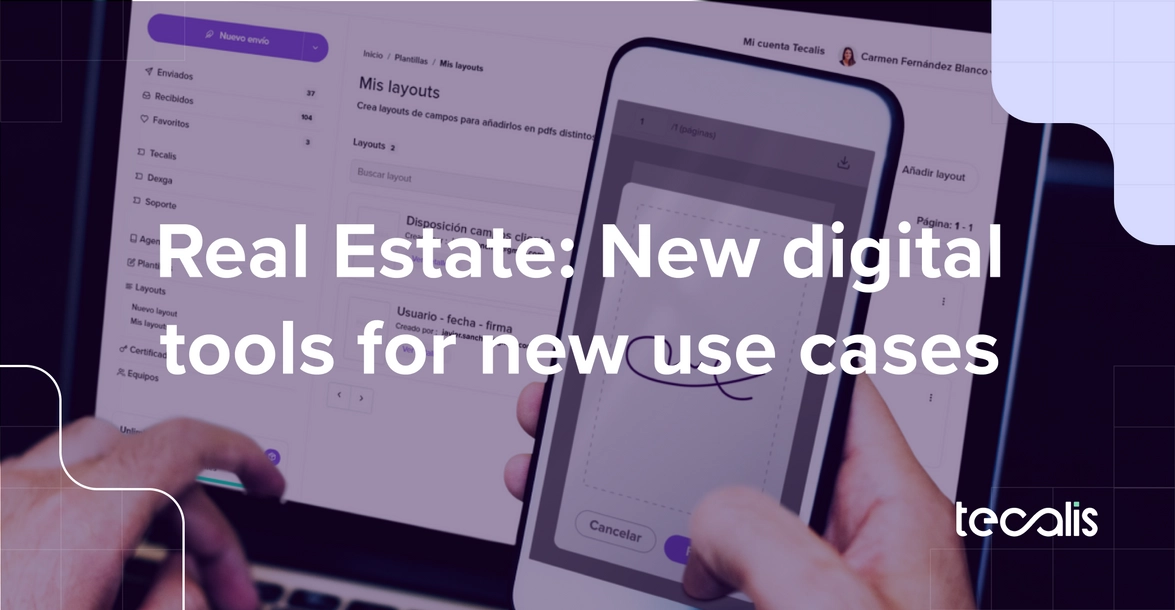Index
Get the latest news right in your inbox
Real estate industry has been undergoing an accelerated digital transformation process in recent years. New technologies have created opportunities to optimize operations and improve the customer experience in the sector.
Industry professionals must adapt and address how digital tools are redefining Real Estate, what opportunities they are creating and what key trends are shaping the sector.
Real Estate: News and trends
Real estate is at a crossroads between traditional and digital. Technological disruption is driving the adoption of advanced tools - many of them supported by artificial intelligence technologies - that enable real estate agents, investors, tenants and landlords to transact faster, cheaper and more securely. These are some of the main current trends in Real Estate:
- PropTech: This term, derived from the combination of "Property" and "Technology," refers to the use of technology to improve real estate services and operations. From crowdfunding platforms to AI, PropTech has changed the way properties are bought, sold and managed.
- Process automation: The adoption of relationship management systems has transformed the way real estate agencies interact with clients, allowing them to automate tasks such as signing contracts, writing property descriptions and collecting documents.
- Blockchain and smart contracts: The use of blockchain for real estate transactions is becoming increasingly common, enabling the automation of processes through smart contracts that are automatically executed when certain conditions are met or sent.
Digital tools for new use cases
Digital transformation in real estate is not only evident in the adoption of new technologies, but also in the way these tools are integrated into everyday processes. Real Estate companies are using solutions such as predictive analytics, digital management platforms and artificial intelligence to streamline operations, increase security and improve transparency in transactions.

e-Signature
Electronic signatures are one of the most widely adopted technologies in the real estate industry. It allows agents and clients to sign documents from anywhere in the world instantly and with full legal backing, eliminating the need for physical meetings and streamlining transactions. Thanks to platforms such as Tecalis Sign, signing contracts is now a fast and secure process.
This solution not only reduces time, but also improves traceability and compliance, making it an essential tool in any modern Real Estate business.
Real estate contracts involving large sums of money require additional guarantees. In this regard, advanced electronic signatures and solutions that verify the identity of the signatory guarantee the authenticity of each document, significantly reducing the risk of fraud.

KYC/AML ID Verification
Another key aspect in Digital Real Estate is identity verification. In a world where real estate transactions are increasingly digital, proper identification of the parties involved is essential. Identity verification technologies make it possible to instantly validate the authenticity of buyers, sellers and tenants, using techniques such as face recognition and document verification.
Identity verification systems help prevent fraudulent activities, such as identity theft, which can be a problem in high-value transactions. Real estate companies, particularly PropTechs, have adopted these solutions to ensure secure transactions and comply with Know Your Customer (KYC) and anti-money laundering (AML) regulations on digital real estate and investment platforms (mandatory to implement by sector and national regulation).
E-notices (certified communication)
In the real estate sector, certified communication through electronic notifications has become a key tool to ensure that important messages, such as lease notices, contract renewals or legal notices, reach their addressee quickly, securely and with a guarantee of non-repudiation (non-waivability). This type of communication is essential to streamline processes and provide a verifiable digital trail, which is especially useful in transactions with legal or financial implications.
Certified electronic notifications allow real estate agencies and property managers to ensure that recipients have received and read the documents sent. In addition, they provide a digital certificate and time stamp that serves as legal proof in case of disputes, reducing risks and facilitating dispute resolution.
PropTech and Real Estate companies that implement this type of electronic notifications not only optimize their operations, but also reinforce customer confidence, ensuring that any relevant communication is handled in a professional and transparent manner.
AI systems and further tools
The use of artificial intelligence (AI) and advanced technologies such as computer vision and OCR (optical character recognition) for anti-fraud controls and other associated processes is revolutionizing the way real estate companies manage documents and data. These tools make it possible not only to digitize documents, but also to analyze them automatically and accurately to extract relevant information that can be used in downstream processes such as identity verification or risk assessment.
Through computer vision, systems can detect whether a document has been tampered with or is authentic, while OCR converts information from documents into structured data. This is especially useful in due diligence processes and for regulatory compliance, where the review and validation of large quantities of documents is required.
Bank scraping is another emerging technology that is gaining popularity in the real estate industry. It is a tool that allows real estate companies to obtain financial information directly from clients' bank accounts, with their consent. This process is especially useful for verifying income, assessing the financial capacity of buyers or tenants (bank scoring) and facilitating the mortgage or rental approval process.
Featured use cases
The adoption of digital tools in Real Estate has been driven by the need to improve efficiency, security and speed of processes. The following highlights some key use cases that show how technologies such as e-signatures and identity verification are transforming the real estate sector:
- Buying and selling properties: Digital platforms allow buyers and sellers to sign contracts from anywhere in the world, eliminating the need for physical meetings.
- Property leasing: Signing leases digitally reduces waiting time and streamlines the formalization of agreements.
- Real estate investments: Real estate crowdfunding platforms, such as Crowdestate or Fundrise, allow small investors to participate in large projects through electronic signatures.
- Tenant verification: Identity verification tools allow you to verify the identity and creditworthiness of tenants quickly and accurately, reducing the risk of fraud.
- Commercial property management: Large companies are using electronic signatures to manage contracts with multiple suppliers and customers.
- Notarial registries: Some countries are already allowing the registration of real estate transactions through electronic signatures, eliminating the need for face-to-face procedures at notaries' offices.
- Mortgage financing: Digital signatures streamline the mortgage application and approval process, improving the customer experience.
- Legal process automation: Real estate lawyers are using digital tools to automate the drafting and signing of legal documents.
- Purchase of international properties: The electronic signature facilitates the purchase of properties in other countries, avoiding the need to travel.
- Inspection certifications: Property inspections can be digitally certified, streamlining the buying and selling process.
- Commercial lease agreements: Large real estate companies are using electronic signatures to enter into commercial leases in multiple locations.
- Property auctions: Some digital platforms allow participation in real estate auctions from anywhere in the world via electronic signature.
- Land purchase: Project developers use electronic signatures to expedite the purchase of land for construction.
- Transactions in secondary markets: Buying and selling properties in secondary markets is facilitated by the digital signature.
- Energy certifications: Contracts related to the energy efficiency of properties can be managed remotely via electronic signature.
Thanks to the tools discussed above, it is possible to perform a detailed analysis of the client's financial profile in a matter of minutes, enabling faster, data-driven decisions. This automation not only improves operational efficiency, but also reduces the risk of human error and increases transparency in due diligence processes.
AI tools and bank scraping are providing a new level of accuracy, savings and speed in financial and document data management, enabling real estate companies to operate more securely and efficiently in an increasingly digital environment.

Laws and regulations in RE: New standards and how to comply in an automated way
Regulatory compliance is one of the biggest challenges for real estate companies, especially when it comes to international regulations. New laws and regulations affecting the industry include:
- General Data Protection Regulation (GDPR): This EU regulation imposes strict requirements on the protection of personal data. Tools such as Tecalis allow you to automate GDPR compliance, ensuring that customer and investor data is handled properly and stored in a document manager such as Tecalis Sign.
- Prevention of Money Laundering and Terrorist Financing Act (AML/CFT): This legislation requires companies to verify the identity of their customers to prevent money laundering. RegTech solutions enable real estate agencies to comply with these obligations in an automated manner.
In conclusion, the digitization of the real estate sector is enabling a new era of efficiency, transparency and security. Tools such as electronic signatures and identity verification are now indispensable to streamline processes and reduce risks. PropTechs continue to lead innovation in this field, offering solutions that radically transform the way properties are bought, sold and managed.

























